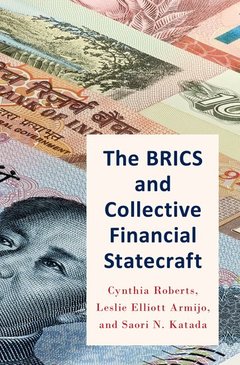The BRICS and Collective Financial Statecraft
Langue : Anglais
Auteurs : Roberts Cynthia, Armijo Leslie, Katada Saori

In the first decade of the 21st century, five rising powers (Brazil, Russia, India, China, and South Africa) formed an exclusive and informal international club, the BRICS. Although neither revolutionaries nor extreme revisionists, the BRICS perceive an ongoing global power shift and contest the West's pretensions to permanent stewardship of the existing economic order. Together they have exercised collective financial statecraft, employing their expanding financial and monetary capabilities for the purpose of achieving larger foreign policy goals. This volume examines the forms and strategies of such collective financial statecraft, and the motivations of each individual government for collaborating through the BRICS club. Their cooperative financial statecraft takes various forms, ranging from pressure for "inside reforms" of either multilateral institutions or global markets, to "outside options" exercised through creating new multilateral institutions or jointly pushing for new realities in international financial markets. To the surprise of many observers, the joint actions of the BRICS are largely successful. Although each member has its unique rationale for collaboration, the largest member, China, controls resources that permit it the greatest influence in intra-club decision-making. The BRICS cooperate due to both common aversions (for example, resentment over being perennial junior partners in global economic and financial governance and resistance to infringements on their autonomy due to U.S. dollar dominance and financial power) and common interests (such as obtaining greater voice in international institutions, as the IMF). The group seeks reforms, influence, and enhanced leadership roles within the liberal capitalist global system. Where blocked, they experiment with parallel multilateral institutions in which they are the dominant rule-makers. The future of the BRICS depends not only on their bargaining power and adjustment to market players, but also on their ability to overcome domestic impediments to sustainable economic growth, the basis for their international influence.
Cynthia Roberts is Associate Professor of Political Science at Hunter College, CUNY; Senior Associate at the Saltzman Institute of War and Peace Studies and Adjunct Associate Professor of International Affairs at Columbia University. Her research focuses on the BRICS, international power shifts, and the liberal world order, and the strategies of major powers. She received her M.A., M.Phil. and Ph.D. from Columbia University and Certificate from the Harriman Institute. Leslie Elliott Armijo teaches Political Economy and Development at the School for International Studies, Simon Fraser University, and has held Visiting Professorships in Brazil (2015) and Germany (2011). She investigates the politics of national and international economic policymaking, and their relationship to democratic consolidation, especially in Brazil, India, and large emerging economies. She holds degrees from Cornell University (B.A.) and the University of California, Berkeley (Ph.D). Saori N. Katada is Associate Professor at School of International Relations at University of Southern California. Katada is the author of several books and numerous articles on trade, financial and monetary cooperation in East Asia and foreign aid. She has her Ph.D. from the University of North Carolina at Chapel Hill (Political Science) and B.A. from Hitotsubashi University (Tokyo). Before joining USC, she worked at the World Bank (Washington D.C.), and the UNDP (Mexico City).
Date de parution : 12-2017
Ouvrage de 288 p.
23.1x15.5 cm
Date de parution : 12-2017
Ouvrage de 288 p.
23.6x16 cm
Thèmes de The BRICS and Collective Financial Statecraft :
© 2024 LAVOISIER S.A.S.



